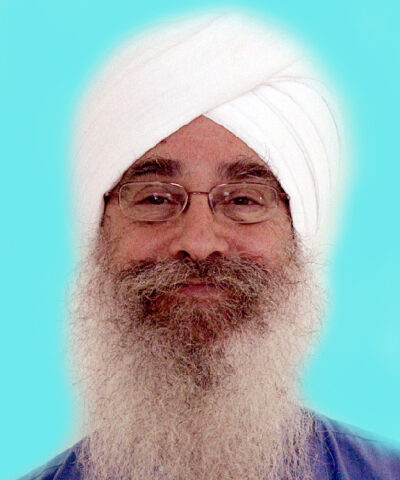by SS Sham Rang Singh Khalsa, Millis, Massachusetts
2022 (Fourth Quarter)
My friend verbally attacks me in a meeting. I feel angry and defensive, but I keep my mouth shut. I sit and contemplate as the meeting proceeds.
Who are we in this time of widely disparate beliefs? Where do we stand? And who even stands there?
Parents, teachers and society train us to individuate and know who we are. We define and then project this refined story of self, even when it requires glossing over inconsistencies, some of which can be major. Some of us even train in verbal or physical combat in order to strengthen, defend and perpetuate this truth and—ultimately—our sense of self.
Yet others have their own sense of the truth. Two people may eyewitness the same event and come away telling very different accounts. And many of our beliefs may not even reside in our own direct experience.
What is my truth? If the “I” experiences something, I am residing then in a state of duality, in a place of the “me” and the “it”. There is something that is beyond this duality: Ek Ong Kar. That’s the only truth beyond conflict, although writing about it is not really it. And here we sit.
What we believe determines what we feel. If somebody else is feeling pain associated with an experience and its continuing set of beliefs, then that’s what they are feeling. If I believed what they believed, then I would be feeling this pain also. To dismiss their pain because I don’t believe what they believe misses the point. Folks on different sides of a controversy are suffering, sometimes even with similar senses of anger, injustice, betrayal, and more.
As I think about my friend’s attack, it occurs to me that he too may be in pain about me holding a different set of beliefs from what he thinks is true. Still stinging from the attack, my forced smile gives me away.
If I am OK with somebody’s suffering, and maybe even think it is their own fault because it’s based on a faulty belief, then my belief is causing me to suffer some degree of aloofness, separation, resentment. And that’s not OK, for me.
If I am responding to someone with different beliefs, with anything other than understanding, then it’s time for me to examine my own projection. Whether I yell and scream or just sit smug and complacent, neither is sitting in presence. Can I simply experience this pain, both his pain and my own? Can I delve deeper and find the awareness of the leela, the play? If not now, then can I come back to it later and dig in? Who is feeling attacked? Who is noticing that one is feeling attacked? How far back can I go to find peace? Can I see the sophisticated spiritual ego trying to do the cool thing here? And also let that go?
The next time I talk to this fellow, I approach with trepidation. Fear of being attacked again? Fear of feeling resentful, angry, and abused instead of what I think I should be feeling—compassionate and neutral? Can I be honest with my negative feelings, seeing them, feeling them and noticing how they influence my present communication? And find love anyway?
All this is not easy, but it sure is valuable. The times are pushing us to go deeper.
ABOUT THE AUTHOR
 SS Dr. Sham Rang Singh is a physician who has served as a minister of Sikh Dharma for four decades. He is a professional trainer in KRI, a member of the Guru Ram Das Ashram in Millis, Massachusetts, and serves on its Board of Directors. Dr. Sham Rang loves the combination of Ayurveda and meditation, Eastern and Western medicine, to help people find deep healing.
SS Dr. Sham Rang Singh is a physician who has served as a minister of Sikh Dharma for four decades. He is a professional trainer in KRI, a member of the Guru Ram Das Ashram in Millis, Massachusetts, and serves on its Board of Directors. Dr. Sham Rang loves the combination of Ayurveda and meditation, Eastern and Western medicine, to help people find deep healing.


